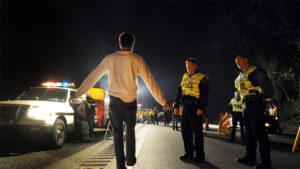 DUI arrests climb this time of year, but most especially during the week between Christmas and New Year’s. Many have taken the week off or at least if they are working, the load is usually lighter. The police are prepared for this week and more DUI patrols and checkpoints are set up to nab drunk drivers. However, our criminal justice system assumes you are innocent until proven guilty. It’s the police officer’s job to help gather the evidence for the prosecutor to convict you in court.
DUI arrests climb this time of year, but most especially during the week between Christmas and New Year’s. Many have taken the week off or at least if they are working, the load is usually lighter. The police are prepared for this week and more DUI patrols and checkpoints are set up to nab drunk drivers. However, our criminal justice system assumes you are innocent until proven guilty. It’s the police officer’s job to help gather the evidence for the prosecutor to convict you in court.
So, let’s review BEFORE it may happen what to do if you’re stopped by a police officer. The first thing you should do is pull over in a safe location. Do it calmly and without any sudden braking or turning. Once the officer has decided to pull you over, he already has the suspicion that you’re impaired so don’t give him more evidence he’ll use against you later. Secondly, once the officer has exited his vehicle, don’t make any sudden movements or gestures. Try to stay calm and wait until he approaches you and asks for something. Make sure you are polite and not answering with an attitude. The obvious reason to treat the officer respectfully is that you are far less likely to be arrested if he believes you are sincerely respectful. If you are rude, insincere, or hostile, the officer is much more likely to take offense, arrest you, and do everything possible to get you convicted, including writing a very incriminating police report. If the officer asks you to step out of the vehicle, you must comply of face the very real possibility of being charged with resisting arrest. Be very helpful and friendly, as though you have nothing better to do than comply with the officer’s requests because, frankly, at that moment you do not. Of course, avoid coming off as insincerely helpful or friendly, as that can be just as off-putting as direct sarcasm.
If you’re asked to step out of the car and the officer begins asking you questions, you should avoid saying anything that might incriminate you. But don’t lie, that will make matters worse and most likely lead to further charges. I’ve written about Miranda rights during a DUI stop before, so I won’t repeat it.
You are under no legal obligation to perform a field sobriety test. Field sobriety tests are one of the most effective tools at the officer’s disposal for collecting evidence against you, not because they are reliable indicators of intoxication, but because it gives the officer subjective observations upon which to base his decision that you are intoxicated. Again, refusing a field sobriety test may result in a suspension of your driver’s license, but would you rather have a scientific examination say you were not drunk or impaired (and therefore not going to jail for DUI or DWI) or would you rather have a jury hear an hour of testimony from a uniformed police officer about how stinking drunk he subjectively thought you were based on a very unscientific field sobriety test?
The best rule of thumb is get a designated driver if you’re going to go out this week and tip a few. If you don’t want to do that, call an Uber or a taxi but don’t drink and drive, it just isn’t worth it.
